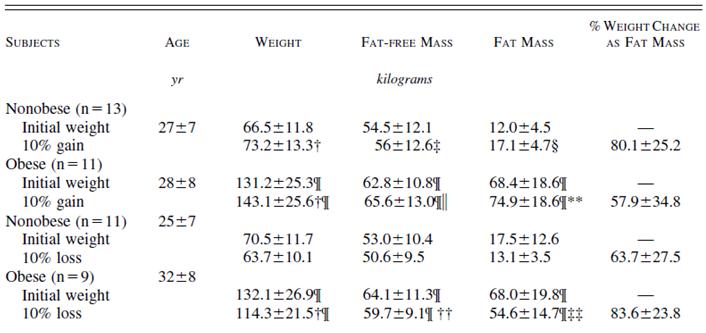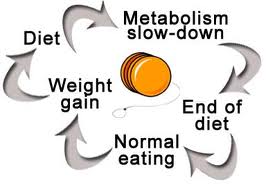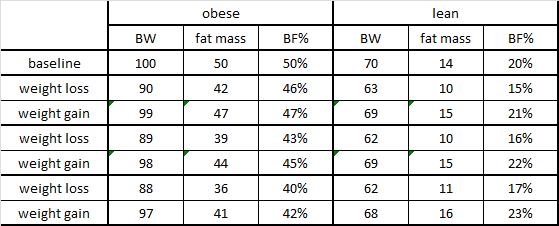If at first you do not succeed, try, try again. Opus 94.
Yo-yo dieting is “probably” not good, but giving up is worse IMO. I say “probably” because obesity researchers have empirically tested just about every single weight loss intervention except this one. Furthermore, you’d be hard pressed to find an obese population who’d agree to undergo an intensive weight loss regimen, only to intentionally regain the weight. Rinse. Repeat. The study would be a nightmare to design from a philosophical perspective, and psychological torture to the volunteers. But what if they did? Would they end up with more fat mass? Less? Right back to where they began?
Changes in energy expenditure resulting from altered body weight (Leibel, Rosenbaum, and Hirsch, 1995)
Maybe you don’t recognize the study by name, but you have definitely heard about their key finding: weight loss causes a decline in metabolic rate which makes further weight loss or simply maintaining more difficult. The other finding was that the opposite also occurs: during weight gain, metabolic rate increases to drive weight back down to its starting point.
All-in-all this was a great experiment and it has a lot of street cred; nobody including myself has ever had anything really bad to say about it. In brief, volunteers were fed either: 1) the maximally tolerated amount of self-selected foods (~6500 kcal!) until they gained 10% of their body weight; or 2) 800 kcal of a liquid formula (40% fat, 45% carbs, and 15% protein) until they lost 10% of their body weight. 
When lean subjects gain 10% of their initial body weight, 80.1% of it is fat mass. In obese subjects, however, only 58% is fat mass. Thus, obese people gain more muscle and less fat than lean people during weight gain (e.g., the holidays). After a 10% weight loss, 64% of the weight is fat mass in lean subjects while a whopping 84% is fat mass in obese subjects. Thus, obese people lose more fat and less muscle than lean people during weight loss (e.g., New Year’s resolutions).
Here goes nothing:
Take a 100 kg (220 pounds) obese person who has 50 kg fat mass (50% body fat) and a 70 kg (154 pounds) lean person with 14 kg fat mass (20% body fat). After 10% weight loss, body weight declines by 10 kg in the obese subject and 7 kg in the lean subject. 83.6% of the weight lost (~8 kg) is fat mass in the obese subject and 63.7% (~4 kg) is fat mass in the lean subject:
After 10% weight regain, body weight increases 9 kg in the obese subject and 6 kg in the lean subject. 60% of the weight gained (5 kg) is fat mass in the obese subject and 80% (5 kg) is fat mass in the lean subject:
By the end of 3 complete yo-yo cycles, the obese person is down 3 kg body weight, but more importantly their fat mass has declined by 9 kg, from 50% to 42% of their body weight (winner!). The unfortunate lean subject, however, despite being 2 kg lighter, now has an additional 2 kg of fat mass; in other words, they lost weight but got fattier (20% body fat to start out, 23% by the end).
To be clear, this study has never been done. But Leibel, Rosenbaum, and Hirsch’s data are impeccable so any flaws in this hypothesis don’t stem from there. The lean subjects in their study were 154 pounds; clearly not a population in dire need of weight loss. Perhaps yo-yo dieting got a bad rap from skinny people trying to get skinner, who instead got fattier and told everyone else to give up if dieting didn’t work the first time. I’m not against pharmacotherapy or bariatric surgery for those in whom diet has failed, but saying “I’m not against” it is a far cry from saying “I’m for it.” Furthermore, given the results from this thought experiment, among other things, I’m definitely saying “try, try again.”
calories proper





